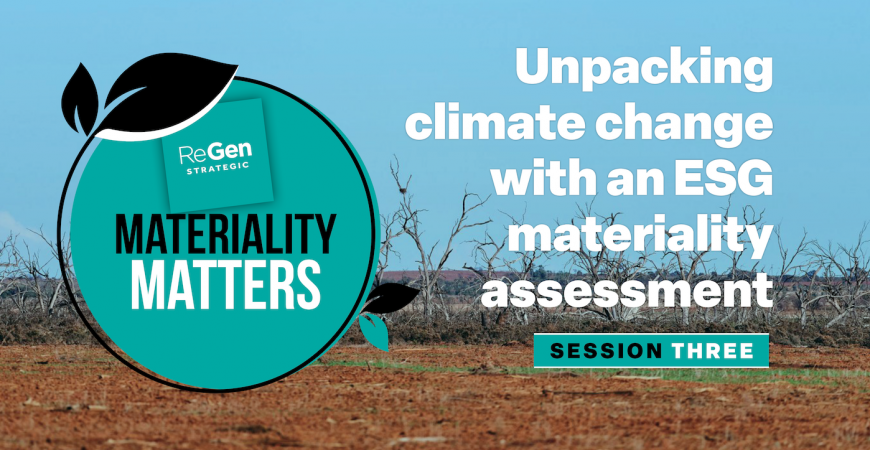More frequent extreme weather, displaced populations, and mass species extinctions – the consequences of global warming for people and planet are becoming apparent, with the performance and transparency of companies on climate change increasingly influential over the decisions of customers, employees, investors and other stakeholders. Given this, it is no surprise that climate change often finds itself at the top of the list of potential material sustainability and ESG topics for many organisations.
As we wait in anticipation for the results of the consultation process of Australia’s exposure draft legislation on climate-related financial disclosures, it is timely for Australian businesses to consider which of the many climate-related sustainability and ESG topics are material for our organisations. This will help us identify what we need to disclose and how to use the new standards.
Topics to consider
Potential climate-related topics to consider include energy, greenhouse gas (GHG) emissions, climate change resilience and air quality, amongst others. An ESG materiality assessment is a tool that assists organisations to prioritise our sustainability efforts by identifying the potential for these and other topics to influence stakeholder perceptions of our organisation, as well as potential impacts associated with each topic. Using a risks and opportunities framework, an ESG materiality assessment sees us assess the potential for our organisation to impact people and planet for each topic, which we refer to as sustainability impacts. It also sees us assess the extent to which a topic might impact our organisation financially, thus satisfying the concept of double materiality.
Climate-related sustainability risks might include the impact on people and planet from our ongoing use of fossil fuels, whether that be directly in the processing of minerals, indirectly in the purchase of electricity generated with fossil fuels or the use of fossil fuels up and down our value chains. Climate-related sustainability opportunities might include the development or use of technologies that enable our organisations and others to reduce their carbon footprints. It might also include opportunities to enhance rehabilitation efforts, with a focus on carbon absorption.
Climate-related financial risks involve the potential for climate change to impact our operations. For example, in Western Australia, risks may include tropical cyclones tracking further south as our climate warms, which may destroy infrastructure that is not built to withstand the extreme weather, resulting in increased repair costs, disruptions to operations and increased insurance costs. They may also include the risks associated with the rapid introduction of tighter emissions regulations that require genuine emissions reduction, if we rely too heavily on offsets for our abatement efforts.
Climate-related financial opportunities can be operational, such as the installation of renewable energy options to reduce energy costs. But, they can also be strategic, such as the adoption of climate-related sustainability opportunities as core product offerings.
SR1 Australian Sustainability Reporting Standards – Disclosure of Climate-related Financial Information, aims to configure the TCFD, IFRS S1 and S2 disclosure requirements to suit Australian organisations, and is proposed for introduction for Australia’s largest companies from 1st January 2025, before being rolled out for other companies over the next three years.
Performed by our sustainability and ESG consultants, a ReGen Strategic ESG materiality assessment will help get you ready for this new regulatory landscape. It will also prepare you to meet the expectations of your many stakeholders, as we work to both mitigate and adapt to climate change.
 ReGen Strategic
ReGen Strategic